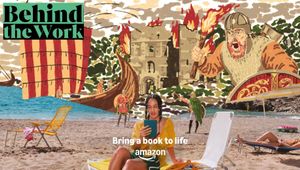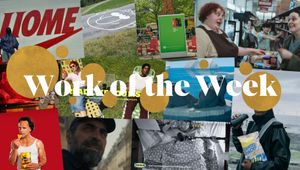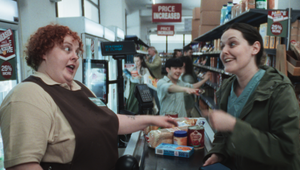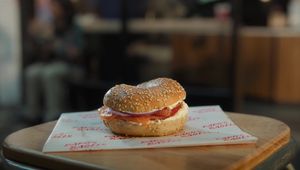
LBB Film Club: God Bless You, My Son

Using the Jamaican dialect of Patois, the dancehall music genre is infamous for its ‘riddims’. Originating in the '70s, dancehall taps into reggae music and puts a twist on it. Having invented the use of sampling and looping in music, the genre’s origins brought together local communities to dance, enjoy the sound and escape from the political tension that made 1970s Jamaica a difficult period to live.
This documentary follows artists across the country as they explain what the genre means to them, how they got into music, and the positive impact it’s had on their lives. It also captures Jamaica for what it is: a beautiful country with beaches and palm trees, but one that also contains disparity, crime and violence - which many believe can be avoided with the right guidance for young people who fall onto the wrong path.
The film’s director, Nathan Miller, grew up listening to the genre, likening the vibe in Jamaica to London’s Notting Hill Carnival. With roots and an upbringing which introduced him to the music style, Nathan wanted to tell the authentic story of Jamaica as a country, how dancehall has blown up, and the implications of its spread across the world.
Nathan sat down with LBB’s Nisna Mahtani to speak about the film which has welcomed praise for conveying the musical genre and country of Jamaica authentically.
LBB> Let's start with hearing a little bit about the dancehall genre. How would you describe it to someone who hasn’t heard the music before?
Nathan> For people who’ve been to Notting Hill Carnival in London, that’s the closest thing I can liken to the genre. It’s all about colour, music, beats and a fun vibe. Of course, Jamaica is where it originated and so it’s authentic there; with its roots in the reggae genre, it’s always a good vibe and a good time when the music is playing.
LBB> And how did you first get introduced to the genre?
Nathan> I’ve grown up with it and with a love of the genre. It was always playing around the house and so it was natural for me to get into the music. It’s something I’ve had a passion for and enjoyed pretty much my whole life.
LBB> What prompted you to want to share more about this music with the world? Why was it an important story to tell?
Nathan> I feel like you can tell when things are bubbling, and right now, there are a lot of hot new artists and there is a lot of new music out there. Considering how well-tuned I am to the genre, it felt like, ‘why haven’t I made this yet?’ So ultimately, it was a ‘why not?’ moment.
The fact is that a lot of these artists are getting millions of views, but there just isn't much coverage. There are a couple of platforms out in Jamaica where they do interviews, and they're good. But in terms of translating those stories into films and documentaries, there's not much of that - that I've seen. When I was researching and putting together a deck to try and help myself understand the film, I noticed how hard it is even to find really nice imagery of Jamaica that wasn’t shot in the ‘90s, early 2000s, or the early 2010s. So, I wanted to tell the story.
This project also came to pass due to a bit of personal frustration that some projects I work on take a lot of time, yet still might not see the light of day. I hadn’t released something off my own back in so long, so I just thought ‘let’s do it’ and that’s how it happened. I wanted to take a bold risk and make it happen. Like I said, if you’ve grown up with it, it’s a no-brainer.

LBB> How did you approach the filmmaking process?
Nathan> It’s not like a shoot in London or in Toronto where you can pull up with a camera and put a camera in the street. I wouldn’t recommend that. You need to make connections, and the process was old school rules of cold calls and emailing a couple of artists, or finding their managers and sending them an email. Once one or two people reply, it easily turns into a thing.
A few shows were happening in London before Jamaica, so when the artists were coming over to London, I’d meet them and we’d build that rapport before I even touched the ground in Jamaica. It was all put together through word of mouth, and what’s funny is that when the film came out, I had some artists or artist managers reach out to me and say I should’ve included certain people, but I had already reached out and it just never happened.
The films are the first of their kind in recent years. Noisey [Vybz Kartel - Noisey Jamaica] did something on the genre around eight to 10 years ago, and a lot changed in that time. It opened up the floodgates of what’s possible, because since it released, there have been so many DMs and people throwing around ideas - ‘we should do a part to’ or ‘can we turn this into something longer’ - but it originated in being curious and sending the initial emails.
I also didn’t want to show Jamaica in a bad light!
LBB> What was your approach to the interviewing process?
Nathan> The process was quite candid. I wish I’d done more research, to be honest, but I’ve done so many interviews over the years that I’m quite comfortable just freestyling it. It helps when you know the artist because a couple of times, I was interviewing someone and they said, ‘Oh, you should interview my friend, he’s gonna be big’, so I had to talk to people, chop it up. The thread that connected most people’s story was about why they’re making music, where they’re coming from and how music makes a difference to their lives.
The stereotypical image of Jamaica is rum, jerk chicken and vibes, but there’s a real undercurrent of issues that go on in Jamaica and people have to live with them. Day by day, the interviewees were saying ‘don't just show the pretty side of things. You must, must go to the ghetto and show that side of things’. I was trying to make it quite real, so that people watching it would say ‘this person was really in Jamaica’.
LBB> How did you wind up with the 14-minute film, and are there plans to do a part two?
Nathan> That was very deliberate, because initially there was a 35-minute edit of the film that I had to scrap. The longer it was, the more the cracks started to form because I wasn’t able to get everybody that I needed in order to tell the story that I wanted to tell. And in a way, the 14 minutes was kind of making the best of a bad situation, because it took so much out of me to make it and then it was taking so much time editing it.
It was a decision about ‘do I release something longer, but doesn't quite hit the mark?’, or ‘do I just scale it back and just try and tell everyone through without even?’. Initially, I wanted to go into different paths and different stories, and have individuals tell their stories. But instead, I chose to have everyone's voices merge into one, and just collectively tell the story of what's happening.
I think there could be a potential to expand on it. I don't know about possibly doing a part two, but I guess it could technically turn into a part two. The way I describe this is that it's like a taster for something that could potentially come.

LBB> The editing process would have been where everything came together. When it came to choosing the clips, were there any that you immediately knew you’d have to include?
Nathan> This is probably the most difficult edit I've done. I pride myself on being quite good at editing the story, but this one was very difficult because I wanted to include everybody that took part in the film.
There were a lot of stories. There was a story of an artist/producer telling me about when his house burned down. An artist was telling me when he got shot. There were really deep themes. Some people had way more time than others didn’t, but I didn't want it to come to be one-sided. And then when I first started, an artist manager told me straight off the bat to be sure everyone received equal (enough) coverage.
The aim was to find the most common answers or themes. If eight people tell you the same thing, that’s the story you should tell. If it was longer, you’d want to use what was unsaid and elaborate on things. I had to scale it back, and that was the trickiest part.
LBB> Can you talk us through making the film more accessible through the subtitles?
Nathan> I was going to make it so that you’d have to toggle them, but the team at Biscuit said that I should keep them on. I was speaking to my friend, and his grandad is Jamaican, and he said he struggled to understand what was being said. It’s a weird one because growing up, I thought people could understand Patois because people are technically speaking English, but it is tricky sometimes.
I watched this cool video on YouTube where someone breaks down how Patois has words derived from Wolof and west African languages. It’s crazy interesting to know how things have been derived, such as the word for spider, which is derived from the Gambian language. So, I added the subtitles so that people would be able to understand - without scratching their head.
LBB> What has the response to the film been like?
Nathan> When the video was just getting a couple of views, I got a DM from a music entertainment lawyer saying, ‘thank you for portraying these artists who are representing a different light’, because right now, there's a spotlight on the negative effects of these guys doing this music.
It’s also been great to see aspiring filmmakers and other shooters on the island saying, ‘you’ve given me an idea to do this’, and ‘I feel like the floodgates have opened a bit because you’ve shown that there’s content and filmmaking that people might not have considered’.

LBB> Were there any surprising moments during the filmmaking process?
Nathan> I’ve been to Jamaica once before. If you Google it, it will say ‘we strongly advise you not to go.’ But it was so clear to me – and it was something I knew deep down - how inviting and welcoming Jamaicans are. This was the first project that my family members were worried about me working on, but it was nice to be in the country with an open mind.
I was in a part of Kingston called Grants Pen, and when my friends and I popped out of the car, it was a very different atmosphere because we saw guys on the corner with balaclavas on, giving me the feeling of ‘where am I right now?’. But we walked around the corner and saw a Danish couple dancing, people from Sweden, and the DJ was on the mic hyping up the songs. They were saying how the crew from Sweden and London are in the building, and hearing that plus the bass - it just made us feel welcome.
It’s a vibe. It’s just the vibe.
LBB> What are some of the other projects you’re working on currently? Can you tell us more about the film you’re doing with J Hus?
Nathan> I’m working on the J Hus project, which is the one thing people always ask me about. Technically that’s been in production since 2018, but as I said, documentaries aren’t straightforward, so hopefully one day. Until then, we can wish upon a star!
We also have something with Mo Gilligan coming out. I’m not sure when, but those are in the pipeline.
LBB> Is there anything else you wanted to mention?
Nathan> Just how inviting the island is and how welcoming the people are! I want to encourage people to not be afraid to go. Don’t let the internet determine whether you’re going to go and meet the beautiful people who live there.















